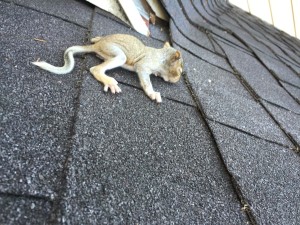When Carpenter Bees and Woodpeckers Attack
March 21, 2016Grey Squirrel Mating Season and You
April 5, 2016
Early spring is a magical time for everyone and a romantic one for squirrels. By the end of winter, eastern grey squirrels and southern flying squirrels have already begun their mating rituals. Pregnant females are looking for a place to nest and often choose attics. If you’re hearing scampering and other noises in your home’s attic, it is important to call a professional pest removal service immediately. Though animal lovers may be tempted to let nature takes its course until the baby squirrels grow up and leave on their own, there are many compelling reasons why you should not do so.
Chewing Damage
Baby squirrels start teething when they are 3 to 5 weeks old, with their bottom incisors forming first. They have a full set of chewing teeth by the time they are 14 weeks old, and they will use them. A lot. The result may be damage to your roof truss, shingles, insulation and electrical wiring. Wiring is of particular concern as bare wires are a fire hazard.
Unpleasant Odors
Any squirrel roaming in your attic could fall down inside of a wall and be unable to get back out. This is especially likely with baby squirrels, they are blind until they are about five weeks old and lack the claws necessary to climb a wall until eight weeks of age. A squirrel trapped inside your wall will die there, creating an extremely unpleasant odor and possibly staining your drywall with body fluids. The decaying corpse will also attract unwanted insects. Many homeowner have been forced to hire Urban Wildlife Control to cut holes in their walls for carcass removal.
Health Concerns
Where there are squirrels, there are squirrel feces. This is not the most pleasant discovery when you go into the attic to bring down the holiday decorations. Urban Wildlife Control provides animal feces removal.
If the thought of squirrel poop in your attic isn’t quite enough to make you call pest control, remember that squirrels can carry diseases as well as fleas and ticks. Getting rid of them is the best way to ensure they don’t share their maladies with your family.
All Grown Up
After about 14 weeks in your cozy attic, baby squirrels are ready to strike out on their own. If you’re lucky, they will leave the nest through the same opening their mother has been using to run in and out for food. If you’re not, the new squirrels will chew their own way out through your roof and shingles, possibly causing roof leaks. Once these squirrels reach sexual maturity they may return to your home to have their litter, starting this process all over again.
Save yourself time and money by removing squirrels in your attic as soon as you suspect their presence. A professional pest removal service can remove them for you and seal access points so you don’t have uninvited guests again.


